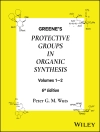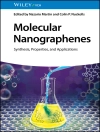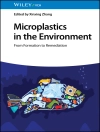Greener Fischer-Tropsch Processes
How can we use our carbon-based resources in the most responsible manner? How can we most efficiently transform natural gas, coal, or biomass into diesel, jet fuel or gasoline to drive our machines? The Big Questions today are energy-related, and the Fischer-Tropsch process provides industrially tested solutions.
This book offers a comprehensive and up-to-date overview of the Fischer-Tropsch process, from the basic science and engineering to commercial issues. It covers industrial, economic, environmental, and fundamental aspects, with a specific focus on “green” concepts such as sustainability, process improvement, waste-reduction, and environmental care.
The result is a practical reference for researchers, engineers, and financial analysts working in the energy sector, who are interested in carbon conversion, fuel processing or synthetic fuel technologies. It is also an ideal introductory book on the Fischer-Tropsch process for graduate courses in chemistry and chemical engineering.
Jadual kandungan
PREFACE
PART ONE: Introduction
WHAT IS FISCHER –
TROPSCH?
Feedstocks for Fuel and for Chemicals Manufacture
The Problems
Fuels for Transportation
Feedstocks for the Chemical Industry
Sustainability and Renewables: Alternatives to Fossil Fuels
The Way Forward
XTL and the Fischer –
Tropsch Process (FTP)
Alternatives to Fischer –
Tropsch
PART TWO: Industrial and Economics Aspects
SYNGAS: THE BASIS OF FISCHER –
TROPSCH
Syngas as Feedstock 19
Routes to Syngas: XTL (X ? Gas, Coal, Biomass, and Waste)
Water-Gas Shift Reaction (WGSR)
Synthesis Gas Cleanup
Thermal and Carbon Efficiency
The XTL Gas Loop
CO2 Production and CO2 as Feedstock 46
FISCHER –
TROPSCH TECHNOLOGY
Introduction
Industrially Applied FT Technologies
FT Catalysts
Requirements for Industrial Catalysts
FT Reactors
Selecting the Right FT Technology
Selecting the FT Operating Conditions
Selecting the FT Catalyst Type
Other Factors That Affect FT Technology Selection
WHAT CAN WE DO WITH FISCHER –
TROPSCH PRODUCTS?
Introduction
Composition of Fischer –
Tropsch Syncrude
Syncrude Recovery after Fischer –
Tropsch Synthesis
Fuel Products from Fischer –
Tropsch Syncrude
Lubricants from Fischer –
Tropsch Syncrude
Petrochemical Products from Fischer –
Tropsch Syncrude
INDUSTRIAL CASE STUDIES
Introduction
A Brief History of Industrial FT Development
Industrial FT Facilities
Perspectives on Industrial Developments
OTHER INDUSTRIALLY IMPORTANT SYNGAS REACTIONS
Survey of CO Hydrogenation Reactions
Syngas to Methanol
Syngas to Dimethyl Ether (DME)
Syngas to Ethanol
Syngas to Acetic Acid
Higher Hydrocarbons and Higher Oxygenates
Hydroformylation
Other Reactions Based on Syngas
FISCHER –
TROPSCH PROCESS ECONOMICS
Introduction and Background
Market Outlook (Natural Gas)
Capital Cost
Operating Costs
Revenues
Economics and Sensitivity Analysis
PART THREE: Fundamental Aspects
PREPARATION OF IRON FT CATALYSTS
Introduction
High-Temperature Fischer –
Tropsch (HTFT) Catalysts
Low-Temperature Catalysts
Individual Steps
COBALT FT CATALYSTS
Introduction
Early German Work
Support Preparation
Addition of Cobalt and Promoters
Calcination
Reduction
Catalyst Transfer
Catalyst Attrition
Addendum Recent Literature Summary
OTHER FT CATALYSTS
Introduction
Ni Catalysts
Ruthenium Catalysts
Rhodium Catalysts
Other Catalysts and Promoters
SURFACE SCIENCE STUDIES RELATED TO FISCHER?TROPSCH REACTIONS
Introduction: Surfaces in Catalysts and Catalytic Cycles
Heterogeneous Catalyst Characterization
Species Detected on Surfaces
Theoretical Calculations
MECHANISTIC STUDIES RELATED TO THE FISCHER –
TROPSCH HYDROCARBON SYNTHESIS AND SOME COGNATE PROCESSES
Introduction
Basic FT Reaction: Dissociative and Associative Paths
Some Mechanisms-Related Experimental Studies
Current Views on the Mechanisms of the FT-S
Now: Toward a Consensus?
Dual FT Mechanisms
Cognate Processes: The Formation of Oxygenates in FT-S
Dual Mechanisms Summary
Improvements by Catalyst Modifications
Catalyst Activation and Deactivation Processes
Desorption and Displacement Effects
Directions for Future Researches
Caveat
PART FOUR: Environmental Aspects
FISCHER –
TROPSCH CATALYST LIFE CYCLE
Introduction
Catalyst Manufacturing
Catalyst Consumption
Catalyst Disposal
FISCHER –
TROPSCH SYNCRUDE: TO REFINE OR TO UPGRADE?
Introduction
Wax Hydrocracking and Hydroisomerization
Olefin Dimerization and Oligomerization
ENVIRONMENTAL SUSTAINABILITY
Introduction
Impact of FT Facilities on the Environment
Water and Wastewater Management
Solid Waste Management
Air Quality Management
Environmental Footprint of FT Refineries
PART FIVE: Future Prospects
NEW DIRECTIONS, CHALLENGES, AND OPPORTUNITIES
Introduction
Why Go Along the Fischer –
Tropsch Route?
Considerations against Fischer –
Tropsch Facilities
Opportunities to Improve Fischer –
Tropsch Facilities
Fundamental Studies: Keys to Improved FT Processes
Challenges for the Future
Conclusions
GLOSSARY
INDEX
Mengenai Pengarang
Peter Maitlis is Professor Emeritus of Inorganic Chemistry at the University of Sheffield. His researches are concerned with the interaction of organic molecules with metals, where he is currently developing a closer understanding of heterogeneously catalyzed reactions. He has co-authored over 350 scientific papers as well as three books on catalysis, and has lectured extensively. His work has been recognized internationally: he was elected FRS in 1984, and was made a Socio of the Accademia dei Lincei in Rome in 1999. He has been President of the Dalton Division of the RSC, Chairman, of the SERC Chemistry Committee in the UK, and has also worked in the USA (Cornell and Harvard), and in Canada (Mc Master University).
Arno de Klerk holds postgraduate qualifications in both analytical chemistry and chemical engineering. In 2001 he was appointed as research manager of the Fischer-Tropsch Refinery Catalysis group, being responsible for catalysis research related to conversion processes for upgrading Fischer-Tropsch syncrude to fuels and chemicals. In 2009 he relocated from South Africa to Canada and took up his present position at the University of Alberta. He has authored publications in the fields of engineering, catalysis, chemistry and refining. He is author of the book “Fischer-Tropsch Refining” also published by Wiley-VCH (ISBN 978-3-527-32605-1).












